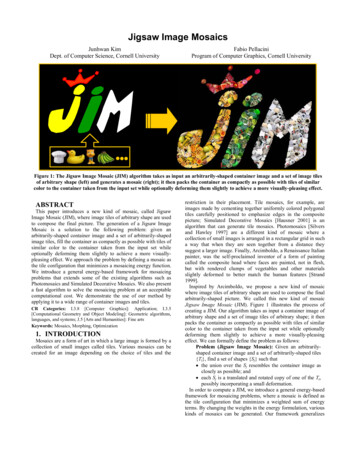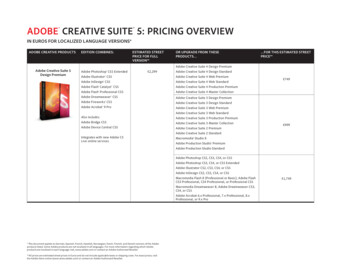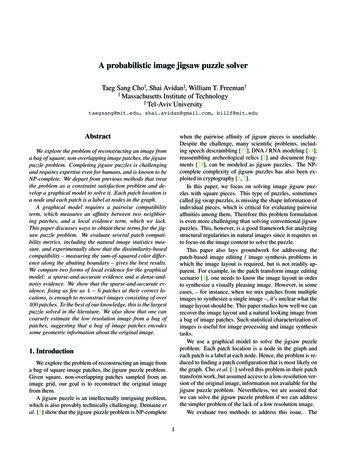
Transcription
Key inspection reportDomiciliary care agenciesName:Jigsaw Creative CareAddress:63 Milford RoadReadingBerkshireRG1 8LGThe quality rating for this domiciliary care agency is:three star excellent serviceA quality rating is our assessment of how well an agency is meeting the needs of thepeople who use it. We give a quality rating following a full review of the service. Wecall this full review a ‘key’ inspection.Lead inspector:Yvonne SoudenDate:24072009
This is a review of quality of outcomes that people experience in this agency. We believehigh quality care should Be safeHave the right outcomes, including clinical outcomesBe a good experience for the people that use itHelp prevent illness, and promote healthy, independent livingBe available to those who need it when they need it.The first part of the review gives the overall quality rating for the agency: 3210stars - excellentstars - goodstar - adequatestar - poorThere is also a bar chart that gives a quick way of seeing the quality of care that thehome provides under key areas that matter to people.There is a summary of what we think this service does well, what they have improvedon and, where it applies, what they need to do better. We use the national minimumstandards to describe the outcomes that people should experience. National minimumstandards are written by the Department of Health for each type of care service.After the summary there is more detail about our findings. The following table explainswhat you will see under each outcome area.Outcome area (for example User focussed services)These are the outcomes that people using domiciliary care agencies should experience.things that people have said are important to them:They reflect theThis box tells you the outcomes that we will always inspect against when we do a keyinspection.This box tells you any additional outcomes that we may inspect against when we do akey inspection.This is what people using this domiciliary care agency experience:Judgement:This box tells you our opinion of what we have looked at in this outcome area. Wewill say whether it is excellent, good, adequate or poor.Evidence:This box describes the information we used to come to our judgement.Domiciliary Care AgenciesPage 2 of 20
We review the quality of the service against outcomes from the National MinimumStandards (NMS). Those standards are written by the Department of Health for eachtype of care service.Copies of the National Minimum Standards – Domiciliary Care Agencies can be found atwww.dh.gov.uk or bought from The Stationery Office (TSO) PO Box 29, St Crispins,Duke Street, Norwich, NR3 1GN. Tel: 0870 600 5522. Online ordering from theStationery Office is also available: www.tso.co.uk/bookshopThe mission of the Care Quality Commission is to make care better for people by: Regulating health and adult social care services to ensure quality and safetystandards, drive improvement and stamp out bad practice Protecting the rights of people who use services, particularly the mostvulnerable and those detained under the Mental Health Act 1983 Providing accessible, trustworthy information on the quality of care andservices so people can make better decisions about their care and so thatcommissioners and providers of services can improve services. Providing independent public accountability on how commissioners andproviders of services are improving the quality of care and providing valuefor money.Reader InformationDocument PurposeInspection reportAuthorCare Quality CommissionAudienceGeneral publicFurther copies from0870 240 7535 (telephone order line)CopyrightCopyright (2009) Care Quality Commission (CQC).This publication may be reproduced in whole or in part,free of charge, in any format or medium provided thatit is not used for commercial gain. This consent issubject to the material being reproduced accuratelyand on proviso that it is not used in a derogatorymanner or misleading context. The material should beacknowledged as CQC copyright, with the title and dateof publication of the document specified.Internet addresswww.cqc.org.ukDomiciliary Care AgenciesPage 3 of 20
Information about the agencyName of agency:Jigsaw Creative CareAddress:63 Milford RoadReadingBerkshireRG1 8LGTelephone number:01189571146Fax number:01189571271Email address:jwoods@jigsawcreativecare.co.ukProvider web address:Name of registered provider(s):Jigsaw Creative Care LtdConditions of registration:Date of last inspectionBrief description of the agencyJigsaw Creative Care Limited is a domiciliary care agency that specialises mostly insupporting adults with learning disabilities, who have complex and challengingbehaviour.The Agency was established in 1996 and has an office in Reading close to the mainshopping centre. People who use the service mostly live in shared livingaccommodation with 24 hour support from a staff team employed by the agency.Domiciliary Care AgenciesPage 4 of 20
SummaryThis is an overview of what we found during the inspection.The quality rating for this agency is:three star excellent serviceOur judgement for each outcome:User focussed servicesProtectionpeterchartPersonal careManagers and staffOrganisation and running of the businessPoorAdequateGoodExcellentHow we did our inspection:The last key inspection took place on the 19th April 2007, and an annual review of theservice took place on the 24th April 2008. This key inspection was unannounced andtook place on the 24th July 2009. The registered person was present throughout theinspection.A tour of the premises took place and a number of files and documentation wereexamined as part of the inspection that included clients files, staff training andrecruitment files, quality assurance information and the agencies Annual QualityAssurance Assessment (AQAA) as required by the commission.We received surveys that we had sent to people who use the service, staff, and healthand social care professionals to gain their view of the service provided by the agency.Domiciliary Care AgenciesPage 5 of 20
What the agency does well:People who use the service are involved in the process of having their needs assessedand reviewed regularly. Support plans have been developed to promote the person'sindependence and describe how the person wants those needs to be met. People whouse the service said that their privacy and dignity is always respected by support staff.Staff say that they receive support from management, and receive a good trainingprogramme that helps them meet the needs of the people who use the service.Staff training and recruitment is good which ensures the protection of the people whouse the service. A good quality assurance system ensures the views of the people whouse the service and of their family, friends and other people who have an interest inthe agency are listened to.People who use the service benefit from using an agency that is managed well.What has improved since the last inspection?The agency has reviewed medication systems used to administer clients' medication.This was because they wanted to support and promote the independence of peoplewho administer their own medication.The agency continues to monitor and improve the service they provide to make surepeople who use the service are safe and that their individual needs are met.What they could do better:The agency should improve the detail recorded within their complaints log book, andshould keep the main individual record of complaint within the personal file of theperson receiving support, and or within the support workers personal file.If you want to know what action the person responsible for this agency is takingfollowing this report, you can contact them using the details on page 4.The report of this inspection is available from our website www.cqc.org.uk.You can get printed copies from enquiries@cqc.org.uk or by telephoning ourorder line 0870 240 7535.Domiciliary Care AgenciesPage 6 of 20
Details of our findingsContentsUser focussed services (standards 1 - 6)Personal care (standards 7 - 10)Protection (standards 11 - 16)Managers and staff (standards 17 - 21)Organisation and running of the business (standards 22 - 27)Outstanding statutory requirementsRequirements and recommendations from this inspectionDomiciliary Care AgenciesPage 7 of 20
User focussed servicesThese are the outcomes that people using domiciliary care agencies should experience.They reflect the things that people have said are important to them:People are confident that the agency can support them. This is because there is anaccurate needs assessment, which they, or someone close to them, have beeninvolved in. This tells the agency all about them and the support they need and iscarried out before they are offered a personal domiciliary care service.People and their relatives can decide whether the agency can meet their supportneeds. This is because they, or someone close to them, have got full, clear, accurateand up to date information about the agency. People know that the agency can meettheir needs because staff have the skills and experience to give them the care theyneed. If they decide to use the agency they know about their rights andresponsibilities because there is an easy to understand contract or statement of termsand conditions between them and the agency that includes how much they will payand what the agency provides for their money. People are confident that the agencyhandles information about them appropriately. This is because the agency follows theirpolicies and procedures. They get a consistent, and flexible care service from reliableand dependable staff members.This is what people using this domiciliary care agency experience:Judgement:People using this service experience excellent quality outcomes in this area. We havemade this judgement using a range of evidence, including a visit to this service.People who use the service have their care needs assessed prior to a service beingoffered and have those needs regularly reviewed.Evidence:Health and social care professionals say the agency's assessment arrangementsensure the right service is planned for the people who use the service. One commentwas, 'Jigsaw Creative Care is creative, flexible and responsive in meeting individuals'needs'.Support staff say that they are always given up to date information about the needs ofthe people who use the service.Domiciliary Care AgenciesPage 8 of 20
Evidence:Assessments we viewed looked at the needs of the individual, and how to meet thoseneeds and minimise risk whilst promoting the persons independence. Other recordsshow that the agency works well with health and social care professionals to ensurethe people who use the service receive the support they need, and that they are fullyinvolved in the review of their assessed needs.Some of the people who receive support from the agency have complex challengingneeds and require one to one support, whilst others require less support. The agencyprovides 24 hour support to the people who use the service. This includes individualstaff teams' to support groups of people within shared living accommodation and tosupport people who live on their own. People who use the service say that staff arealways there to support them.Domiciliary Care AgenciesPage 9 of 20
Personal careThese are the outcomes that people using domiciliary care agencies should experience.They reflect the things that people have said are important to them:Each person is treated as an individual and the agency is responsive to his or her race,culture, religion, age, disability, gender and sexual orientation. Their right to privacy isrespected and the support they get from workers is given in a way that maintains theirdignity. If people take medicine, they manage it themselves if they can. If peoplecannot manage their medicine, the agency supports them with it in a safe way.People’s needs and goals are met. The agency has a plan of care that the person, orsomeone close to them, has been involved in making. They are able to make decisionsabout their life, with support if they need it, as the staff promote their rights, choicesand independence.This is what people using this domiciliary care agency experience:Judgement:People using this service experience excellent quality outcomes in this area. We havemade this judgement using a range of evidence, including a visit to this service.People who use the service have their health and personal care needs met by a caringand respectful staff team who support the wishes of the client from a detailed plan ofcare.The agency's policies and procedures on medication and health related activitiesprotect the people who use the service and assist them to maintain responsibility fortheir own medication.Evidence:People who use the service have a care plan that the agency refers to as the persons'Essential Life Plan'. The essential life plan is in word and picture format and describeshow the person wants to be supported by staff. For example, one plan described thetype of challenging behaviour the person could present and how this should bemanaged by staff.Other records viewed demonstrate that the agency promotes the independence oftheir clients, for example, a weekly planner supports the person around the choicesthey have made, whilst risk assessments detail the persons level of vulnerability, andDomiciliary Care AgenciesPage 10 of 20
Evidence:has an action plan to minimise the risk of other people taking advantage.People who use the service say that support staff always respect their privacy anddignity. One client said, 'staff allow me independence time to go out by myself andmeet my friends'. Staff say that they receive training that enables them to providesupport to the people who use the service, and a social care professional said, 'theagency does well by promoting independence and enabling clients to develop controlover their own lives'.Staff support clients with their medication, and records show that staff have receivedthe training and support they need to carry out this task. Health and social careprofessionals say that the agency always supports people who use the service toadminister their own medication, or to manage it correctly where this is not possible.Clients risk assessments have been completed to minimise the risk of medicationincidents, and confirm if the person is competent to administer their own medicationfollowing consultation with the clients care manager and health. The risk assessmentis used as a constant monitoring tool, for example, to ensure the medication of aclient who administers their own medication is reviewed every two to three days bysupport staff.Domiciliary Care AgenciesPage 11 of 20
ProtectionThese are the outcomes that people using domiciliary care agencies should experience.They reflect the things that people have said are important to them:People using the agency are safeguarded. This is because the agency follows healthand safety procedures, keeps records appropriately and ensures their staff followpolicies and understand the importance of assessing risks. The agency safeguardspeople from abuse, neglect and self harm and takes action to follow up anyallegations.People are confident that their property and money will always be safe as the agencyfollows the right procedures. Their health and rights are safeguarded as the staff keepan accurate record in their home of all the support they give them.This is what people using this domiciliary care agency experience:Judgement:People using this service experience good quality outcomes in this area. We havemade this judgement using a range of evidence, including a visit to this service.The health, safety and welfare of the people who use the service and staff is promotedand protected by the agency.People who use the agency are protected by the agencies safeguarding procedures.Evidence:The agency has systems and procedures in place to comply with the requirements ofhealth and safety legislation that includes staff training, risk assessments and policiesand procedures, for example, reporting and investigating incidents. A social careprofessional said, 'Jigsaw support individuals with complex and challenging behaviourand refers and manages risks appropriately. They feed back incident reports to meand have a comprehensive internal scrutiny process of these risks'. The agency hassafeguarding policies and procedures and staff receive safeguarding adult training sothat they know what to do and who to go to should they suspect or witness abuse.Staff say that they know what to do if a person they support or relative/advocate orfriend of the person has concerns about the agency and people who use the servicesay that staff listen to them.The agency has demonstrated awareness of the multi agency safeguarding adults'Domiciliary Care AgenciesPage 12 of 20
Evidence:policy and procedure and has referred incidents to the local authority safeguardingteam to investigate. Health and social care professionals say that the agency alwaysrespond appropriately if they, or a person using the service, or another person haveraised any concerns.Domiciliary Care AgenciesPage 13 of 20
Managers and staffThese are the outcomes that people using domiciliary care agencies should experience.They reflect the things that people have said are important to them:People have confidence in the staff at the agency because checks have been done tomake sure that they are fit to do the job. Their needs are met and they are supportedas the staff get relevant training, support and supervision from their managers.People have safe and appropriate support because the staff providing their care arequalified and competent. They are confident that the staff that provide their supportare clear about their roles and responsibilities.This is what people using this domiciliary care agency experience:Judgement:People using this service experience excellent quality outcomes in this area. We havemade this judgement using a range of evidence, including a visit to this service.People who use the service are protected by the agencies policies and procedures onthe recruitment and selection of staff.Staff are trained and receive good support to meet the personal care needs of thepeople who use the service.Evidence:We reviewed the recruitment files for four members of staff. All necessary preemployment checks had been undertaken including two references, employmenthistory and CRB clearance obtained.Staff said that their induction covered everything they needed to know to do the jobwhen they started. Staff files show that new staff complete an induction checklist thatinforms them of the agency's policies and procedures, topics specific to clients needs,and documentation used within each of the supported living services.Staff said that they are given training relevant to their role, which helps themunderstand and meet the individual needs of the people who use the service, andkeeps them up to date with new ways of working. Records show that following staffinduction, staff receive further training and refresher training to update their skills andknowledge, and that each staff member has a formal meeting with their line managerDomiciliary Care AgenciesPage 14 of 20
Evidence:each month to discuss how they are working.Staff are supported to complete a learning disability qualification and option award aspart of their induction. The award can be used at a later date to support the memberof staff to achieve a National Vocational Qualification in care (NVQ). Of the 43 carestaff employed by the agency 27 have an NVQ in care and 12 are in the process ofattaining the award.Domiciliary Care AgenciesPage 15 of 20
Organisation and running of the businessThese are the outcomes that people using domiciliary care agencies should experience.They reflect the things that people have said are important to them:People get consistent and planned support from the agency because the manager runsit appropriately with an open approach that makes them feel valued and respected.People using the agency are safeguarded because it follows financial and accountingprocedures, keeps record appropriately and ensures that their staff follow policies. Ifpeople have concerns about the agency they, or people close to them, know how tocomplain. Their concern is looked into and action taken to put things right.This is what people using this domiciliary care agency experience:Judgement:People using this service experience good quality outcomes in this area. We havemade this judgement using a range of evidence, including a visit to this service.People who use the service benefit from a consistent and well managed service that isrun in their best interest.Evidence:The agency office has all the equipment that the agency needs to manage the service.It was evident from the records we viewed that the people who use the service receivea consistent, well managed and planned service from the agency's trained and skilledteam of carers, management and administrative staff. A social care professional said,'I have complete confidence in Jigsaw, they are very open to work with and will alwaysengage and seek new ways of working. They provide high quality and consistentstaffing and the clients I support have improved considerably since they have beensupported by Jigsaw'.The agency has a complaint procedure that is accessible in written word and in picturesymbols. People who use the service say that they know how to make a complaint andwho to speak to should they have a concern.The agency keeps all complement and complaint letters with further communicationsof outcome within one file. The agency should detail a brief log of complaints receivedin date order and give a brief account of the complaint, action taken and outcome withDomiciliary Care AgenciesPage 16 of 20
Evidence:timescales recorded. The full record of complaint and outcome should be kept withinthe office personal file of the person receiving support, and or within the supportworkers personal record. This will ensure management have the information they needabout the people they support at all times and will assist management within theirquality monitoring of the service provided.The agency has good quality assurance monitoring systems in place to ensure theagency is run in the best interests of the people who use the service. For example, aperson the agency supports has developed a questionnaire for professionals and wasin the process of sending these out at the time of this inspection, and the agencysends questionnaires to the people who use the service and to those people with adirect interest in the agency to gain their view of the service provided. Furthermonitoring by the agency includes monthly quality monitoring visits to each service bythe area manager, and daily shift reports to the registered manager from each of theservices. This keeps the manager fully informed of daily activities within each sharedliving accommodation, and of any changing occurrences.Domiciliary Care AgenciesPage 17 of 20
Are there any outstanding requirements from the last inspection?Yes NoROutstanding statutory requirementsThese are requirements that were set at the previous inspection, but have still notbeen met. They say what the registered person had to do to meet the Care StandardsAct 2000, Domiciliary Care Agencies Regulations 2002 and the National MinimumStandards.No.StandardDomiciliary Care AgenciesRegulationRequirementTimescale foractionPage 18 of 20
Requirements and recommendations from this inspection:Immediate requirements:These are immediate requirements that were set on the day we visited this domiciliarycare agency. The registered person had to meet these within 48 hours.No.StandardRegulationRequirementTimescale foractionStatutory requirementsThese requirements set out what the registered person must do to meet the CareStandards Act 2000, Domiciliary Care Agencies Regulations 2002 and the NationalMinimum Standards. The registered person(s) must do this within the timescales wehave set.No.StandardRegulationRequirementTimescale foractionRecommendationsThese recommendations are taken from the best practice described in the NationalMinimum Standards and the registered person(s) should consider them as a way ofimproving their service.NoRefer to StandardDomiciliary Care AgenciesGood Practice RecommendationsPage 19 of 20
Helpline:Telephone: 03000 616161Email: enquiries@cqc.org.ukWeb: www.cqc.org.ukWe want people to be able to access this information. If you would like a summary in adifferent format or language please contact our helpline or go to our website.Copyright (2009) Care Quality Commission (CQC). This publication may bereproduced in whole or in part, free of charge, in any format or medium provided that itis not used for commercial gain. This consent is subject to the material beingreproduced accurately and on proviso that it is not used in a derogatory manner ormisleading context. The material should be acknowledged as CQC copyright, with thetitle and date of publication of the document specified.Domiciliary Care AgenciesPage 20 of 20
Domiciliary Care Agencies Page 4 of 20 Information about the agency Name of agency: Jigsaw Creative Care Address: 63 Milford Road Reading Berkshire RG1 8LG Telephone number: 01189571146 Fax number: 01189571271 Email address: jwoods@jigsawcreativecare.co.uk Provider web address: Name of registered provider(s): Jigsaw Creative Care Ltd .










